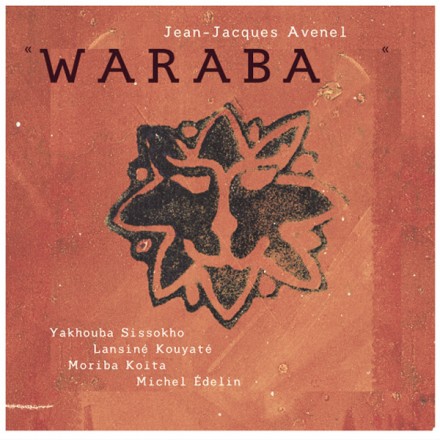Jean-Jacques Avenel
Waraba
SGL SA1549-2West Africa has a very rich culture dating back at least to the unification of the Mande Empire in the 13th century. In the 1960s and ’70s its traditional praise-songs and associated instrumental styles – particularly those of the kora (21-string harp-lute) as adapted for electric guitar – were taken up by bandleaders such as Djelimadi Tounkara, and incorporated into a popular music resurgence which eventually swept the world. The great French bassist Jean-Jacques Avenel (Le Havre, 1948-Paris, 2014) was a member of Steve Lacy’s groups starting in 1981, and also began playing the kora around that time. This is the recording debut of his Paris-based world jazz group Waraba (“The Lion” in the Bamana language). They perform traditional Manding tunes as well as their own compositions and re-compositions but approach them in a jazz way, with the focus on improvisation. Avenel’s Malian and Gambian bandmates performed with Salif Keita, Mory Kanté, Manu Dibango and other Afropop stars, but they have the traditional music in their bones and an openness to experiments. French flutist Michel Edelin provides a second jazz voice on many tracks. Avenel’s beautiful bass sound and rhythmic vitality spur the band on, the overall vibe is sweet, intense, and joyful, and the delicious blend of timbres is perfectly caught by the DSD recording. Avenel explained the group’s origins:
“My interest in African music, its rhythmic richness, its sonorities, developed with my study of the sanza [thumb piano] and then the kora (and its repertoire). The idea of blending the double bass with these instruments is an old dream which was sketched out on my solo record Eclaircie (1985). Meeting Yakhouba I owe to Phillipe Conrath, who invited us to perform at the Africolor Festival in 1997. This was a fruitful encounter, and we decided to continue. Yakhouba became my kora teacher, my friend and musical partner. Through him I met Moriba and Lansiné. The basic trio: Yakhouba, Lansiné and me. Sometimes Moriba replaces Lansiné; joined by Michel Edelin (2000).
“[This music] is a meeting of individuals, a sharing of knowledge and passions, a desire to open things up and a respect for tradition. (Structured) improvisation is our playing field. The essential thing in this music is play, where the pleasure of playing is collective. The music is created around themes (introduced by one or the other of us) and improvisations on the harmonic structures (very simple) and rhythmic structures. The different ways of playing (traditional or a more modern approach) are expressed in a collective exchange from which soloists emerge.”
A few highlights: the rhythmic excitement of Avenel’s solo composition “Pi-Pande” where he overdubs bass and kora, and then lightly adds in a second bass for color and harmony; the shifting interplay and lovely textures of n’gonis, flutes and bass on Koïta’s stately tune “Batou Kagni”; the Caribbean insouciance and subtle orchestration of “Jarabi”; the ensemble groove with its figure/ground interchange of solos and riffs in “Kaïra”; and the sophisticated syncopations and accents that balance the touching simplicity of the classic “Tubaka.”
Jean-Jacques Avenel, self-taught on bass, made his professional debut in 1972 with vocalist Colette Magny and the expatriate American Steve Waring. He was active in the Parisian free jazz movement, performing with Noah Howard, Frank Wright’s quartet and pianist François Tusques’s Intercommunal Free Dance Music Orchestra. He performed and recorded with saxophonist Daunik Lazro in the late ’70s and early ’80s, replaced Kent Carter in Steve Lacy’s quintet in 1981 and recorded on 28 Lacy CDs. In the ’80s he also performed and recorded with Butch Morris and Tristan Honsinger’s groups, and in the ’90s with David Murray, also working with several younger European pianists – Antonio Farao, Benoît Delbecq (Pursuit, Songlines 1999), Gaël Mevel, and the Australian Chris Cody – and recording with Lacy in Mal Waldron’s trio. He also worked with Don Cherry, Richard Galliano, George Lewis, Pharoah Sanders, Archie Shepp, Dino Saluzzi, Paul Bley, and many others.
“…refinement sans exoticism…an album of great discernment.” – Jazzman (France)
